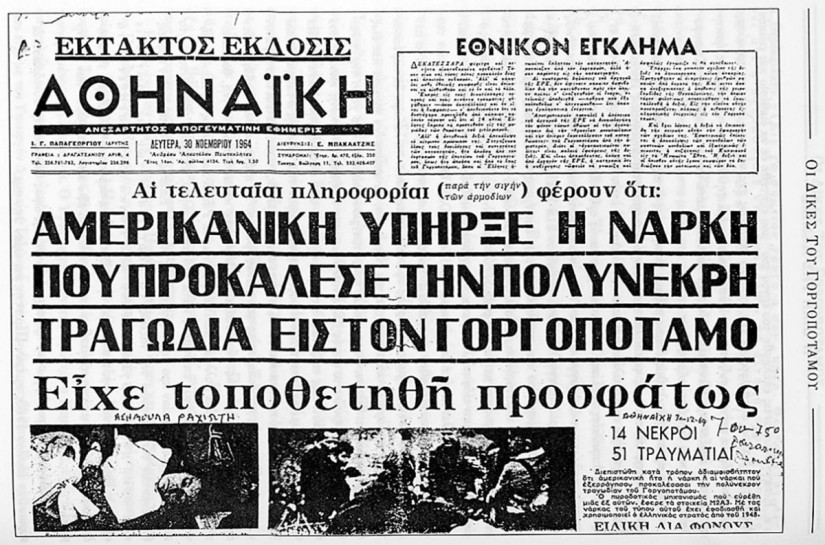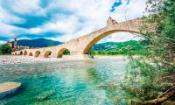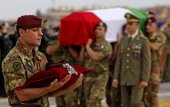Ήρωες, άπαρτα βουνά.
Ήρωες, με δώδεκα ζωές,
κάστρα του Ολύμπου
και του Παρνασσού φαντάσματα,
ήρωες μες στα χαλάσματα.
Kάστρα του Ολύμπου
και του Παρνασσού φαντάσματα,
ήρωες μες στα χαλάσματα.
Αίματα, κόκκινο νερό,
αίματα, ποτάμι βουερό,
πυρ στην Αλαμάνα
και φωτιά στο Γοργοπόταμο
και φωτιά στο Γοργοπόταμο.
Πυρ στην Αλαμάνα
και φωτιά στο Γοργοπόταμο
και φωτιά στο Γοργοπόταμο.
Εμπρός αδέρφια εμπρός
κι είναι μαζί μας ο λαός
στα πιο μεγάλα μας τα κατορθώματα,
μες στις πέτρες και στα χώματα,
μες στις πέτρες και στα χώματα.
Θάνατος, μαύρος αδερφός.
Θάνατος, θα γίνω αθάνατος,
πυρ στην Αλαμάνα
και φωτιά στο Γοργοπόταμο
και φωτιά στο Γοργοπόταμο.
Πυρ στην Αλαμάνα
και φωτιά στο Γοργοπόταμο
και φωτιά στο Γοργοπόταμο.
Αέρας στις κορφές
μαύρο φεγγάρι στις καρδιές
έλα και πάρε μόνος σου τη λευτεριά
με τραγούδια, όπλα και σπαθιά,
με τραγούδια, όπλα και σπαθιά.
Ήρωες, άπαρτα βουνά.
Ήρωες, με δώδεκα ζωές,
κάστρα του Ολύμπου
και του Παρνασσού φαντάσματα,
ήρωες μες στα χαλάσματα.
Kάστρα του Ολύμπου
και του Παρνασσού φαντάσματα,
ήρωες μες στα χαλάσματα.
Ήρωες, με δώδεκα ζωές,
κάστρα του Ολύμπου
και του Παρνασσού φαντάσματα,
ήρωες μες στα χαλάσματα.
Kάστρα του Ολύμπου
και του Παρνασσού φαντάσματα,
ήρωες μες στα χαλάσματα.
Αίματα, κόκκινο νερό,
αίματα, ποτάμι βουερό,
πυρ στην Αλαμάνα
και φωτιά στο Γοργοπόταμο
και φωτιά στο Γοργοπόταμο.
Πυρ στην Αλαμάνα
και φωτιά στο Γοργοπόταμο
και φωτιά στο Γοργοπόταμο.
Εμπρός αδέρφια εμπρός
κι είναι μαζί μας ο λαός
στα πιο μεγάλα μας τα κατορθώματα,
μες στις πέτρες και στα χώματα,
μες στις πέτρες και στα χώματα.
Θάνατος, μαύρος αδερφός.
Θάνατος, θα γίνω αθάνατος,
πυρ στην Αλαμάνα
και φωτιά στο Γοργοπόταμο
και φωτιά στο Γοργοπόταμο.
Πυρ στην Αλαμάνα
και φωτιά στο Γοργοπόταμο
και φωτιά στο Γοργοπόταμο.
Αέρας στις κορφές
μαύρο φεγγάρι στις καρδιές
έλα και πάρε μόνος σου τη λευτεριά
με τραγούδια, όπλα και σπαθιά,
με τραγούδια, όπλα και σπαθιά.
Ήρωες, άπαρτα βουνά.
Ήρωες, με δώδεκα ζωές,
κάστρα του Ολύμπου
και του Παρνασσού φαντάσματα,
ήρωες μες στα χαλάσματα.
Kάστρα του Ολύμπου
και του Παρνασσού φαντάσματα,
ήρωες μες στα χαλάσματα.
Contributed by Riccardo Venturi - Ελληνικό Τμήμα των ΑΠΤ "Gian Piero Testa" - Riccardo Gullotta - 2019/3/26 - 12:43
Language: Italian
Traduzione italiana / Μετέφρασε στα ιταλικά / Italian translation / Traduction italienne / Italiankielinen käännös:
Riccardo Venturi, 26-03-2019 12:45

E ancora il Gorgopotamo. Il 29 novembre 1964 circa ventimila antifascisti greci si erano radunati sotto il ponte ferroviario fatto saltare 22 anni prima (il 25 novembre 1942) dalla Resistenza, e che era stato peraltro ricostruito secondo il progetto originale dell'ingegnere italiano Agostino Tacconi, proprio dalle forze di occupazione italiane (diciannove giorni dopo). Ad un certo punto ci fu una tremenda esplosione tra la folla: tredici persone saltarono in aria su una mina americana M2A3, piazzata ci fu chi disse ai tempi della guerra civile del 1946-1949, ma ci fu anche chi disse in tempi assai più recenti (“curiosamente” il terreno sotto il ponte non era mai stato sminato, né i manifestanti erano stati informati del pericolo). Vi furono anche 51 feriti gravi. Dopo la strage, una folla inferocita cominciò a gridare: “Assassini! Assassini!”, e vi furono gravi scontri. Di questa strage dimenticata vogliamo ricordare i nomi delle tredici vittime: Georgios Giannakoulis, Nikolaos Dasopoulos, Konstandinos Kaniouras, Christos Kestinis, Konstandinos Lembesis, Kiki Diakopoulou (una ragazzina di 12 anni), Konstandina Boti, Dimitrios Mylonas, Irodion Papazachariou, Apostolos Polymeros, Asimoula Rachioti, Konstandinos Tsarouchas, Dimos Tsindikidis.

Riccardo Venturi, 26-03-2019 12:45

E ancora il Gorgopotamo. Il 29 novembre 1964 circa ventimila antifascisti greci si erano radunati sotto il ponte ferroviario fatto saltare 22 anni prima (il 25 novembre 1942) dalla Resistenza, e che era stato peraltro ricostruito secondo il progetto originale dell'ingegnere italiano Agostino Tacconi, proprio dalle forze di occupazione italiane (diciannove giorni dopo). Ad un certo punto ci fu una tremenda esplosione tra la folla: tredici persone saltarono in aria su una mina americana M2A3, piazzata ci fu chi disse ai tempi della guerra civile del 1946-1949, ma ci fu anche chi disse in tempi assai più recenti (“curiosamente” il terreno sotto il ponte non era mai stato sminato, né i manifestanti erano stati informati del pericolo). Vi furono anche 51 feriti gravi. Dopo la strage, una folla inferocita cominciò a gridare: “Assassini! Assassini!”, e vi furono gravi scontri. Di questa strage dimenticata vogliamo ricordare i nomi delle tredici vittime: Georgios Giannakoulis, Nikolaos Dasopoulos, Konstandinos Kaniouras, Christos Kestinis, Konstandinos Lembesis, Kiki Diakopoulou (una ragazzina di 12 anni), Konstandina Boti, Dimitrios Mylonas, Irodion Papazachariou, Apostolos Polymeros, Asimoula Rachioti, Konstandinos Tsarouchas, Dimos Tsindikidis.

"Era americana la bomba che ha provocato la tragedia con molte vittime del Gorgopotamo. Era stata piazzata di recente."
EROI
Eroi, montagne inespugnabili.
Eroi, con dodici vite,
accampamenti sull'Olimpo
e fantasmi sul Parnaso,
eroi in mezzo alle rovine.
Αccampamenti sull'Olimpo
e fantasmi sul Parnaso,
eroi in mezzo alle rovine.
Sangue a fiumi, acqua rossa,
sangue a fiumi, fiume fragoroso,
fuoco a Alamana
e fuoco sul Gorgopotamo
e fuoco sul Gorgopotamo.
fuoco a Alamana
e fuoco sul Gorgopotamo
e fuoco sul Gorgopotamo. [1]
Avanti, fratelli, avanti
ché è insieme a noi il popolo
nelle nostre più grandi imprese
tra le pietraie e i terreni,
tra le pietraie e i terreni.
Morte, nera sorella. [2]
Morte, diverrò immortale,
fuoco a Alamana
e fuoco sul Gorgopotamo
e fuoco sul Gorgopotamo.
Fuoco a Alamana
e fuoco sul Gorgopotamo
e fuoco sul Gorgopotamo.
Vento sulle cime
nera luna nei cuori,
vieni e prenditi da solo la libertà
con le canzoni, le armi e le spade,
con le canzoni, le armi e le spade.
Eroi, montagne inespugnabili.
Eroi, con dodici vite,
accampamenti sull'Olimpo
e fantasmi sul Parnaso,
eroi in mezzo alle rovine.
Αccampamenti sull'Olimpo
e fantasmi sul Parnaso,
eroi in mezzo alle rovine.
Eroi, montagne inespugnabili.
Eroi, con dodici vite,
accampamenti sull'Olimpo
e fantasmi sul Parnaso,
eroi in mezzo alle rovine.
Αccampamenti sull'Olimpo
e fantasmi sul Parnaso,
eroi in mezzo alle rovine.
Sangue a fiumi, acqua rossa,
sangue a fiumi, fiume fragoroso,
fuoco a Alamana
e fuoco sul Gorgopotamo
e fuoco sul Gorgopotamo.
fuoco a Alamana
e fuoco sul Gorgopotamo
e fuoco sul Gorgopotamo. [1]
Avanti, fratelli, avanti
ché è insieme a noi il popolo
nelle nostre più grandi imprese
tra le pietraie e i terreni,
tra le pietraie e i terreni.
Morte, nera sorella. [2]
Morte, diverrò immortale,
fuoco a Alamana
e fuoco sul Gorgopotamo
e fuoco sul Gorgopotamo.
Fuoco a Alamana
e fuoco sul Gorgopotamo
e fuoco sul Gorgopotamo.
Vento sulle cime
nera luna nei cuori,
vieni e prenditi da solo la libertà
con le canzoni, le armi e le spade,
con le canzoni, le armi e le spade.
Eroi, montagne inespugnabili.
Eroi, con dodici vite,
accampamenti sull'Olimpo
e fantasmi sul Parnaso,
eroi in mezzo alle rovine.
Αccampamenti sull'Olimpo
e fantasmi sul Parnaso,
eroi in mezzo alle rovine.
[1] Per il Gorgopótamo e Alamana si veda la nota [5] a Στ'άρματα: questa canzone è “ambientata” nella stessa zona. Nella strofa c'è una particolarità linguistica tipicamente ellenica: si usano consecutivamente i due termini per “fuoco”, quello classico (πῦρ [pyr]) e quello popolare (φωτιά [fotiá]).
[2] Il testo originale dice “nero fratello”: non si tratta di una sorta di “virilizzazione” della Morte, ma semplicemente del fatto che, in greco, la “morte” (θάνατος [thánatos]) è di genere grammaticale maschile. Nella traduzione ho messo “nera sorella”, come anche da tradizione secolare.
[2] Il testo originale dice “nero fratello”: non si tratta di una sorta di “virilizzazione” della Morte, ma semplicemente del fatto che, in greco, la “morte” (θάνατος [thánatos]) è di genere grammaticale maschile. Nella traduzione ho messo “nera sorella”, come anche da tradizione secolare.
Language: English
English translation / Μετέφρασε στα αγγλικά / Traduzione inglese / Traduction anglaise / Englanninkielinen käännös:
Riccardo Gullotta
Riccardo Gullotta
HEROES
Heroes, impregnable mountains.
Heroes, with twelve lives,
encampments on the Olympus
and ghosts on the Parnassus,
heroes in the middle of ruins.
Encampments on the Olympus
and ghosts on the Parnassus,
heroes in the middle of ruins.
Blood flowing like rivers, red water,
Blood flowing like rivers, thunderous river,
fire at Alamana
and fire on the Gorgopotamos
and fire on the Gorgopotamos.
fire at Alamana
and fire on the Gorgopotamos
and fire on the Gorgopotamos. [1]
Come on, brothers, come on
as the people are with us
in our biggest undertakings
among stony grounds and lands,
among stony grounds and lands.
Death, black sister. [2]
Death, I will become immortal,
fire at Alamana
and fire on the Gorgopotamos
and fire on the Gorgopotamos.
fire at Alamana
and fire on the Gorgopotamos
and fire on the Gorgopotamos.
Wind on the peaks
black moon into hearts,
come and take freedom on your own
with songs, weapons and swords,
with songs, weapons and swords.
Heroes, impregnable mountains.
Heroes, with twelve lives,
encampments on the Olympus
and ghosts on the Parnassus,
heroes in the middle of ruins.
Encampments on the Olympus
and ghosts on the Parnassus,
heroes in the middle of ruins.
Heroes, impregnable mountains.
Heroes, with twelve lives,
encampments on the Olympus
and ghosts on the Parnassus,
heroes in the middle of ruins.
Encampments on the Olympus
and ghosts on the Parnassus,
heroes in the middle of ruins.
Blood flowing like rivers, red water,
Blood flowing like rivers, thunderous river,
fire at Alamana
and fire on the Gorgopotamos
and fire on the Gorgopotamos.
fire at Alamana
and fire on the Gorgopotamos
and fire on the Gorgopotamos. [1]
Come on, brothers, come on
as the people are with us
in our biggest undertakings
among stony grounds and lands,
among stony grounds and lands.
Death, black sister. [2]
Death, I will become immortal,
fire at Alamana
and fire on the Gorgopotamos
and fire on the Gorgopotamos.
fire at Alamana
and fire on the Gorgopotamos
and fire on the Gorgopotamos.
Wind on the peaks
black moon into hearts,
come and take freedom on your own
with songs, weapons and swords,
with songs, weapons and swords.
Heroes, impregnable mountains.
Heroes, with twelve lives,
encampments on the Olympus
and ghosts on the Parnassus,
heroes in the middle of ruins.
Encampments on the Olympus
and ghosts on the Parnassus,
heroes in the middle of ruins.
[1] About Gorgopótamos and Alamana see note [5] in Στ'άρματα: this song is "set" in the same area. In this stanza there is a typically Hellenic linguistic peculiarity: the two terms for "fire" are consecutively used, the classical one (πῦρ [pyr]) and the popular one (φωτιά [fotiá]).
[2] The original text quotes "black brother": it is not a kind of "virilization" of Death, but it’s simply that in Greek, "death" (θάνατος [thánatos]) is a noun of masculine grammatical gender. In the translation I [Riccardo Venturi] put "black sister", according to a centuries-old legacy too.
[2] The original text quotes "black brother": it is not a kind of "virilization" of Death, but it’s simply that in Greek, "death" (θάνατος [thánatos]) is a noun of masculine grammatical gender. In the translation I [Riccardo Venturi] put "black sister", according to a centuries-old legacy too.
Contributed by Riccardo Gullotta - 2019/4/4 - 12:37
Language: French
Traduction française / Μετέφρασε στα γαλλικά / Traduzione francese / French translation / Ranskankielinen käännös:
Riccardo Gullotta
Riccardo Gullotta
HEROES
Des Héros, des montagnes imprenables.
Des Héros, avec douze vies,
des camps sur l'Olympe
et des fantômes sur le Parnasse,
des héros au milieu des ruines.
Des camps sur l'Olympe
et des fantômes sur le Parnasse,
des héros au milieu des ruines.
Sang dans les rivières, eau rouge,
sang dans les rivières, rivière tonitruante,
feu à Alamana
et feu sur le Gorgopotamus
et feu sur le Gorgopotamus.
feu à Alamana
et feu sur le Gorgopotamus
et feu sur le Gorgopotamus. [1]
Allez, frères, allez
car les gens sont avec nous
dans nos plus grandes entreprises
parmi les terres et les terrains pierreux,
parmi les terres et les terrains pierreux.
Mort, soeur noire. [2]
Mort, je vais devenir immortel,
feu à Alamana
et feu sur le Gorgopotamus
et feu sur le Gorgopotamus.
Feu à Alamana
et feu sur le Gorgopotamus
et feu sur le Gorgopotamus.
Vent sur les pics
lune noire dans les coeurs,
viens prendre la liberté par toi-même
avec des chansons, des armes et des épées,
avec des chansons, des armes et des épées.
Des héros, des montagnes imprenables.
Des Héros, avec douze vies,
des camps sur l'Olympe
et des fantômes sur le Parnasse,
des héros au milieu des ruines.
Des camps sur l'Olympe
et des fantômes sur le Parnasse,
des héros au milieu des ruines.
Des Héros, des montagnes imprenables.
Des Héros, avec douze vies,
des camps sur l'Olympe
et des fantômes sur le Parnasse,
des héros au milieu des ruines.
Des camps sur l'Olympe
et des fantômes sur le Parnasse,
des héros au milieu des ruines.
Sang dans les rivières, eau rouge,
sang dans les rivières, rivière tonitruante,
feu à Alamana
et feu sur le Gorgopotamus
et feu sur le Gorgopotamus.
feu à Alamana
et feu sur le Gorgopotamus
et feu sur le Gorgopotamus. [1]
Allez, frères, allez
car les gens sont avec nous
dans nos plus grandes entreprises
parmi les terres et les terrains pierreux,
parmi les terres et les terrains pierreux.
Mort, soeur noire. [2]
Mort, je vais devenir immortel,
feu à Alamana
et feu sur le Gorgopotamus
et feu sur le Gorgopotamus.
Feu à Alamana
et feu sur le Gorgopotamus
et feu sur le Gorgopotamus.
Vent sur les pics
lune noire dans les coeurs,
viens prendre la liberté par toi-même
avec des chansons, des armes et des épées,
avec des chansons, des armes et des épées.
Des héros, des montagnes imprenables.
Des Héros, avec douze vies,
des camps sur l'Olympe
et des fantômes sur le Parnasse,
des héros au milieu des ruines.
Des camps sur l'Olympe
et des fantômes sur le Parnasse,
des héros au milieu des ruines.
[1] En ce qui concerne Gorgopótamos et Alamana, voir la note [5] dans τ'άρματα: cette chanson est "réglée" dans la même zone. La strophe présente une particularité linguistique typiquement hellénique: les deux mots pour "feu" sont utilisés consécutivement, le classique (πῦρ [pyr]) et le populaire (φωτιά [fotiá]).
[2] Le texte original dit "frère noir": ce n'est pas une sorte de "virilisation" de la Mort, mais tout simplement le fait que, en grec, la "mort" (θάνατος [thánatos]) est du genre grammatical masculin. Dans ma traduction [Riccardo Venturi], j’ai employé "soeur noire", selon aussi une ancienne tradition.
[2] Le texte original dit "frère noir": ce n'est pas une sorte de "virilisation" de la Mort, mais tout simplement le fait que, en grec, la "mort" (θάνατος [thánatos]) est du genre grammatical masculin. Dans ma traduction [Riccardo Venturi], j’ai employé "soeur noire", selon aussi une ancienne tradition.
Contributed by Riccardo Gullotta - 2019/4/4 - 12:47
×
![]()
Note for non-Italian users: Sorry, though the interface of this website is translated into English, most commentaries and biographies are in Italian and/or in other languages like French, German, Spanish, Russian etc.








Interpreti / Ερμηνεία / Performed by / Interprétée par / Laulavat: Petros Pandis e la Piccola Corale Ateniese / Πέτρος Πανδής και η Μικρή Χορωδία Αθηνὠν / Petros Pandis and the Little Choir of Athens / Petros Pandis et le Petit Chœur d'Athènes / Petros Pandis ja Ateenan Pikku Kuoro
Songs of the Greek Resistance
Canzoni della Resistenza Greca
Chants de la Résistance Grecque
Kreikkan vastarintaliikkeen lauluja
Με τον ΠEΤΡΟ ΠΑΝΔH
Con PETROS PANDIS
With PETROS PANDIS
Avec PETROS PANDIS
Laulaa PETROS PANDIS
Διασκευή ενορχήστρωση και διεύθυνση
Adattamento, orchestrazione e direzione
Adaptation, orchestration and direction
Adaptation, orchestration et direction
Sopeutuminen, järjestäminen ja johtaminen
NOTIS MAVROUDIS
ΝΟΤΗΣ ΜΑΥΡΟΥΔΗΣ
1974
1. Μαύρα κοράκια / Mavra korakia
2. Είμαι του ΕΛΑΣ αντάρτης / Eimai tou ELAS o andartis
3. Επέσατε θύματα / Epesate thymata
4. Στ'άρματα / St'armata
5. Ο Μπελογιάννης ζει / O Belogiannis zei
6. Το τραγούδι του Άρη / To tragoudi tou Ari
7. Παιδιά σηκωθείτε / Paidia sikotheite
8. Σαν ατσάλινο τείχος / San atsalino teihos
9. Μαλλιά σγουρά / Mallia sgoura
10. Τί τα θέλουμε τα όπλα / Ti tha theloume ta opla
11. Ήρωες / Iroes
12. Στους δρόμους / Stous dromous
13. Απόψε θα πλαγιάσουμε / Apopse tha plagiasoume
14. Το τραγούδι της σημαίας / To tragoudi tis simaias
15. Το τραγούδι της αγροτιάς / To tragoudi tis agrotias
16. Άνεμοι, θύελλες / Anemoi, thyelles
17. Τι θέλουν οι εχθροί μας / Ti theloun oi ehthroi mas
18. Η μάνα του αντάρτη / I mana tou andarti
19. Φύσα αγέρα / Fysa agera
20. Ακροναυπλία / Akronafplia
Ο πάντα σεμνός και ταπεινός τραγουδιστής Πέτρος Πανδής γεννήθηκε το 1941 στην Κέρκυρα. Εργάστηκε για χρόνια στην Μέση Εκπαίδευση ως καθηγητής. Αν και τραγουδιστής μεγάλης εμβέλειας και δυνατοτήτων δεν εργάστηκε σε μαγαζιά παρά μόνον σε ελάχιστες περιπτώσεις, έγινε γνωστός μέσα από τους δίσκους, τα ρεσιτάλ και τις συναυλίες εντός και εκτός Ελλάδος. Ξεκίνησε σαν τραγουδιστής του "Νέου Κύματος" αλλά γρήγορα το όνομα του συνδέθηκε με το πολιτικοποιημένο τραγούδι και κυρίως με το έργο του μεγάλου Μίκη Θεοδωράκη και δη των Αντάρτικων τραγουδιών ("Τραγούδια από την Ελληνική Αντίσταση" του Νότη Μαυρουδή).
Il sempre riservato ed umile cantante Petros Pandís è nato nel 1941 a Corfù. Per anni ha lavorato come insegnante nelle scuole medie. Sebbene sia un cantante di grande portata e capacità e non abbia lavorato con case discografiche se non in poche occasioni, ha raggiunto la notorietà, in Grecia e all'estero, grazie ai suoi dischi, ai recital e ai concerti. Ha iniziato la sua carriera come cantante della New Wave greca, ma presto il suo nome è stato associato alla canzone politica, specialmente all'opera di Mikis Theodorakis e ai canti della Resistenza greca (i “Canti della Resistenza Greca” di Notis Mavroudís).
Probabilmente tra le più belle canzoni della Resistenza greca, e sicuramente dell'intero album di Mavroudís e Pandís. Siamo ancora nelle montagne della Grecia centrale, presso il Gorgopotamo: è bene ricordare che in Grecia (e in Norvegia) accaddero i primi episodi della Resistenza europea al nazifascismo. Da notare che, in fondo alla canzone, tra i mezzi per conquistarsi la libertà ci sono le armi, le spade, e le canzoni. Le canzoni erano considerate armi importanti. Una canzone non farà finire le guerre, ma sicuramente serve a combattere per la libertà. [RV]